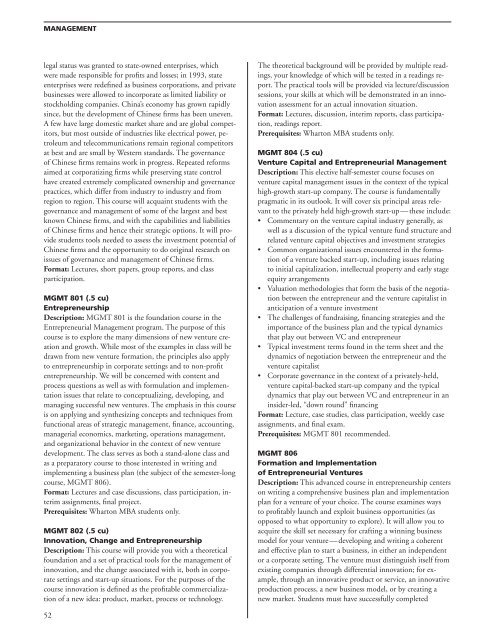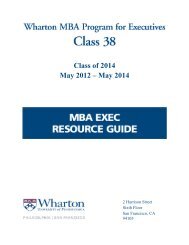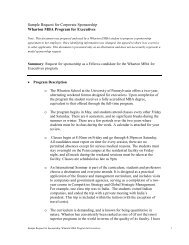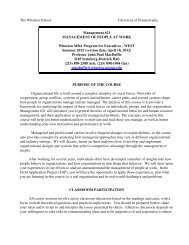Explore Options; Plan Your MBA Academic Program
Explore Options; Plan Your MBA Academic Program
Explore Options; Plan Your MBA Academic Program
You also want an ePaper? Increase the reach of your titles
YUMPU automatically turns print PDFs into web optimized ePapers that Google loves.
MANAGEMENT<br />
legal status was granted to state-owned enterprises, which<br />
were made responsible for profits and losses; in 1993, state<br />
enterprises were redefined as business corporations, and private<br />
businesses were allowed to incorporate as limited liability or<br />
stockholding companies. China’s economy has grown rapidly<br />
since, but the development of Chinese firms has been uneven.<br />
A few have large domestic market share and are global competitors,<br />
but most outside of industries like electrical power, petroleum<br />
and telecommunications remain regional competitors<br />
at best and are small by Western standards. The governance<br />
of Chinese firms remains work in progress. Repeated reforms<br />
aimed at corporatizing firms while preserving state control<br />
have created extremely complicated ownership and governance<br />
practices, which differ from industry to industry and from<br />
region to region. This course will acquaint students with the<br />
governance and management of some of the largest and best<br />
known Chinese firms, and with the capabilities and liabilities<br />
of Chinese firms and hence their strategic options. It will provide<br />
students tools needed to assess the investment potential of<br />
Chinese firms and the opportunity to do original research on<br />
issues of governance and management of Chinese firms.<br />
Format: Lectures, short papers, group reports, and class<br />
participation.<br />
MGMT 801 (.5 cu)<br />
Entrepreneurship<br />
Description: MGMT 801 is the foundation course in the<br />
Entrepreneurial Management program. The purpose of this<br />
course is to explore the many dimensions of new venture creation<br />
and growth. While most of the examples in class will be<br />
drawn from new venture formation, the principles also apply<br />
to entrepreneurship in corporate settings and to non-profit<br />
entrepreneurship. We will be concerned with content and<br />
process questions as well as with formulation and implementation<br />
issues that relate to conceptualizing, developing, and<br />
managing successful new ventures. The emphasis in this course<br />
is on applying and synthesizing concepts and techniques from<br />
functional areas of strategic management, finance, accounting,<br />
managerial economics, marketing, operations management,<br />
and organizational behavior in the context of new venture<br />
development. The class serves as both a stand-alone class and<br />
as a preparatory course to those interested in writing and<br />
implementing a business plan (the subject of the semester-long<br />
course, MGMT 806).<br />
Format: Lectures and case discussions, class participation, interim<br />
assignments, final project.<br />
Prerequisites: Wharton <strong>MBA</strong> students only.<br />
MGMT 802 (.5 cu)<br />
Innovation, Change and Entrepreneurship<br />
Description: This course will provide you with a theoretical<br />
foundation and a set of practical tools for the management of<br />
innovation, and the change associated with it, both in corporate<br />
settings and start-up situations. For the purposes of the<br />
course innovation is defined as the profitable commercialization<br />
of a new idea: product, market, process or technology.<br />
52<br />
The theoretical background will be provided by multiple readings,<br />
your knowledge of which will be tested in a readings report.<br />
The practical tools will be provided via lecture/discussion<br />
sessions, your skills at which will be demonstrated in an innovation<br />
assessment for an actual innovation situation.<br />
Format: Lectures, discussion, interim reports, class participation,<br />
readings report.<br />
Prerequisites: Wharton <strong>MBA</strong> students only.<br />
MGMT 804 (.5 cu)<br />
Venture Capital and Entrepreneurial Management<br />
Description: This elective half-semester course focuses on<br />
venture capital management issues in the context of the typical<br />
high-growth start-up company. The course is fundamentally<br />
pragmatic in its outlook. It will cover six principal areas relevant<br />
to the privately held high-growth start-up — these include:<br />
• Commentary on the venture capital industry generally, as<br />
well as a discussion of the typical venture fund structure and<br />
related venture capital objectives and investment strategies<br />
• Common organizational issues encountered in the formation<br />
of a venture backed start-up, including issues relating<br />
to initial capitalization, intellectual property and early stage<br />
equity arrangements<br />
• Valuation methodologies that form the basis of the negotiation<br />
between the entrepreneur and the venture capitalist in<br />
anticipation of a venture investment<br />
• The challenges of fundraising, financing strategies and the<br />
importance of the business plan and the typical dynamics<br />
that play out between VC and entrepreneur<br />
• Typical investment terms found in the term sheet and the<br />
dynamics of negotiation between the entrepreneur and the<br />
venture capitalist<br />
• Corporate governance in the context of a privately-held,<br />
venture capital-backed start-up company and the typical<br />
dynamics that play out between VC and entrepreneur in an<br />
insider-led, “down round” financing<br />
Format: Lecture, case studies, class participation, weekly case<br />
assignments, and final exam.<br />
Prerequisites: MGMT 801 recommended.<br />
MGMT 806<br />
Formation and Implementation<br />
of Entrepreneurial Ventures<br />
Description: This advanced course in entrepreneurship centers<br />
on writing a comprehensive business plan and implementation<br />
plan for a venture of your choice. The course examines ways<br />
to profitably launch and exploit business opportunities (as<br />
opposed to what opportunity to explore). It will allow you to<br />
acquire the skill set necessary for crafting a winning business<br />
model for your venture — developing and writing a coherent<br />
and effective plan to start a business, in either an independent<br />
or a corporate setting. The venture must distinguish itself from<br />
existing companies through differential innovation; for example,<br />
through an innovative product or service, an innovative<br />
production process, a new business model, or by creating a<br />
new market. Students must have successfully completed

















